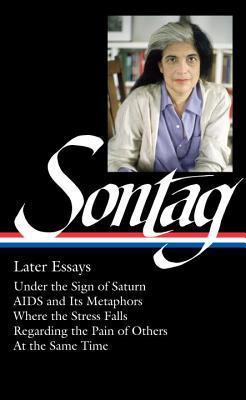
From literature, painting, dance, music, and film to such political flashpoints as the Balkans, the Israeli-Palestinian conflict, 9/11, the Iraq War, and Abu Ghraib, in her final decades Susan Sontag brought her fervent curiosity and expansive intellect to bear on an extraordinarily broad compass of subjects. This second volume in Library of America’s definitive edition of her collected essays gathers Under the Sign of Saturn (1980), AIDS and Its Metaphors (1989), Where the Stress Falls (2001), Regarding the Pain of Others (2003), and At the Same Time (2007), brilliant books in which Sontag did not merely comment on the cultural and political landscape, but helped shape it, solidifying her place as the most provocative and influential critic of her time. “You might say that she has diverted the mainstream,” Hillary Mantel has written. “Her private islands of thought now look like the territory on which we’ve always lived.” Sontag once observed how reading books in translation gave her, from an early age, a sense of literature as “mental travel.” Here is the extraordinary logbook of her literary adventures, scintillating examinations of the writers she most admired and championed: Walter Benjamin, Roland Barthes, Nadine Gordimer, Jorge Luis Borges, Antonin Artaud, Marina Tsvetaeva, W. G. Sebald, Elias Canetti, Machado de Assis, Halldór Laxness, Joseph Brodsky, and Robert Walser among them. The names alone reflect her passion for broadening the cultural frame of reference to encompass the whole world. Sontag writes with unwavering rigor and intensity,asking the most difficult questions and affirming a deep commitment to “extending our sense of what a human life can be,” as she said on accepting the Jerusalem Prize in 2000. In “Fascinating Fascism,” her incisive reading of the films of Leni Riefenstahl, she ponders the insidious allure of Fascist aesthetics. AIDS and Its Metaphors reckons with the HIV crisis through an elaboration of the central themes of her 1978 classic Illness as Metaphor. Regarding the Pain of Others extends her lifelong absorption with photography to explore the troubling moral issues surrounding visual depictions of violence, cruelty, and atrocity. In “A Century of Cinema” she evokes the time, only recently passed, when movies were experienced as “poetic and mysterious and erotic and moral—all at the same time.” “Waiting for Godot in Sarajevo,” an account of staging a production of Beckett’s play in a city under siege, becomes a meditation on the meaning of culture: “Culture, serious culture, is an expression of human dignity—which is what people in Sarajevo feel they have lost.”
Author

Susan Sontag was born in New York City on January 16, 1933, grew up in Tucson, Arizona, and attended high school in Los Angeles. She received her B.A. from the College of the University of Chicago and did graduate work in philosophy, literature, and theology at Harvard University and Saint Anne’s College, Oxford. Her books include four novels, The Benefactor, Death Kit, The Volcano Lover, and In America; a collection of short stories, I, etcetera; several plays, including Alice in Bed and Lady from the Sea; and nine works of nonfiction, starting with Against Interpretation and including On Photography, Illness as Metaphor, Where the Stress Falls, Regarding the Pain of Others, and At the Same Time. In 1982, Farrar, Straus & Giroux published A Susan Sontag Reader. Ms. Sontag wrote and directed four feature-length films: Duet for Cannibals (1969) and Brother Carl (1971), both in Sweden; Promised Lands (1974), made in Israel during the war of October 1973; and Unguided Tour (1983), from her short story of the same name, made in Italy. Her play Alice in Bed has had productions in the United States, Mexico, Germany, and Holland. Another play, Lady from the Sea, has been produced in Italy, France, Switzerland, Germany, and Korea. Ms. Sontag also directed plays in the United States and Europe, including a staging of Beckett's Waiting for Godot in the summer of 1993 in besieged Sarajevo, where she spent much of the time between early 1993 and 1996 and was made an honorary citizen of the city. A human rights activist for more than two decades, Ms. Sontag served from 1987 to 1989 as president of the American Center of PEN, the international writers’ organization dedicated to freedom of expression and the advancement of literature, from which platform she led a number of campaigns on behalf of persecuted and imprisoned writers. Her stories and essays appeared in newspapers, magazines, and literary publications all over the world, including The New York Times, The New Yorker, The New York Review of Books, The Times Literary Supplement, Art in America, Antaeus, Parnassus, The Threepenny Review, The Nation, and Granta. Her books have been translated into thirty-two languages. Among Ms. Sontag's many honors are the 2003 Peace Prize of the German Book Trade, the 2003 Prince of Asturias Prize, the 2001 Jerusalem Prize, the National Book Award for In America (2000), and the National Book Critics Circle Award for On Photography (1978). In 1992 she received the Malaparte Prize in Italy, and in 1999 she was named a Commandeur de l'Ordre des Arts et des Lettres by the French government (she had been named an Officier in the same order in 1984). Between 1990 and 1995 she was a MacArthur Fellow. Ms. Sontag died in New York City on December 28, 2004.